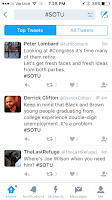The acronym NCHC sounds for the National Collegiate Honors Council and their mission is to "support and enhance the community of educational institutions, professionals, and students who participate in collegiate honors education around the world."
One way they are doing that is through the program Partners in the Park. The program originated out of South Utah University by a man named Matthew Nickerson, who has the honors director for sometime. He partnered up with Paul Roelandt, a ranger from Cedar Breaks and they did the first snowshoeing "project" as they call them. The program is designed to educate honors students who they believe the majority of them will become leaders and teach them about the outdoors. Different ways you can experience, educate them on the history of the parks and the land, how to take care of them so generations to come can have the same experience. They hope to create advocates to not only care and respect for the parks, but to show support for the parks so the government one day doesn't decided to shut them down. They hope students will take these experiences you will continue to share them with her family and friends and then share that experience with the people they love, so on and so forth.
I think it is a great program and I had the opportunity, thanks to the funding provided from the reestablishing Honors program here at Dixie, to go on that same snowshoeing at SUU that started the whole think and meet both Nickerson and Ranger Roelandt. I never experienced snowshoeing, snow that deep, or winter camping and I loved it. I thought it was a great experience and I definitely will be passing it along to my friends and family.
But..... they could use some help promoting themselves.
This is their Facebook page: NCHC: Partners in the Park
Tactics:
- Most projects are during the breaks, great timing for students.
- Post about past projects, contact people who have experienced those past trips.
- Post about future projects, contact people who plan on attending those projects.
- Get in touch with people who put together and host the projects.
- Post news and information on national and state parks and monuments.
- Encourage students, advisers, honors programs to share, tweet and insta their experiences.
Communication Objectives:
1. To promote an opportunity of outdoor experiential learning for driven students in honors programs across the country by gaining outdoor skills and knowledge.
2. To show how to love the national and state parks and monuments, but not love them to death.
3. To teach and build a partnership with the students and the parks so that future partnerships will be taught, shared and flourish and the parks and monuments will have advocates to support and care for them for generations to come.
Target Audience:
Jade Poulmen, 20, Gainsville, FL
Alice is a sophomore at the University of Florida. She has never traveled any farther west than the Mississippi. She has also never seen snow or camping, but she loves to travel, meet new people, and learn from new experiences. She has googled beautiful pictures of the red rock out in southern Utah and thinks snowshoeing in the winter sounds like a great first visit.
Caroline Peebles, 22, St. George, UT
Tanya is a senior,originally from St. George, and attends Dixie State University because out-of-state is out of the question. Tanya loves the outdoors and jumps in her car every weekend she can to experience the wonders southern Utah has to offer. She is an experienced hiker, rock climber, canyoneerer, kayaker, swimmer and mountain biker. She loves to travel when she can afford it and would love to experience something outside of the desert. She wonders if Olympic National Park is as green as she has seen on Pinterest.
Derek Waters, 18, Crow Agency, MT
Derek is a freshman who choose to start college at a Little Big Horn College, because it was cheap, close to home and he figured a community college was a good starting point. Derek is young and inexperienced in may things and like most freshmen still undecided in his major, but he is a hard worker, bright and very intelligent. Montana is all he has ever known and wonders what the warm ocean feels like washing off the sand in between his toes. He can't wait to hear back to about the scholarship he will win to venture to the US Virgin Islands where he will find his inspiration to become an environmental scientist.
















